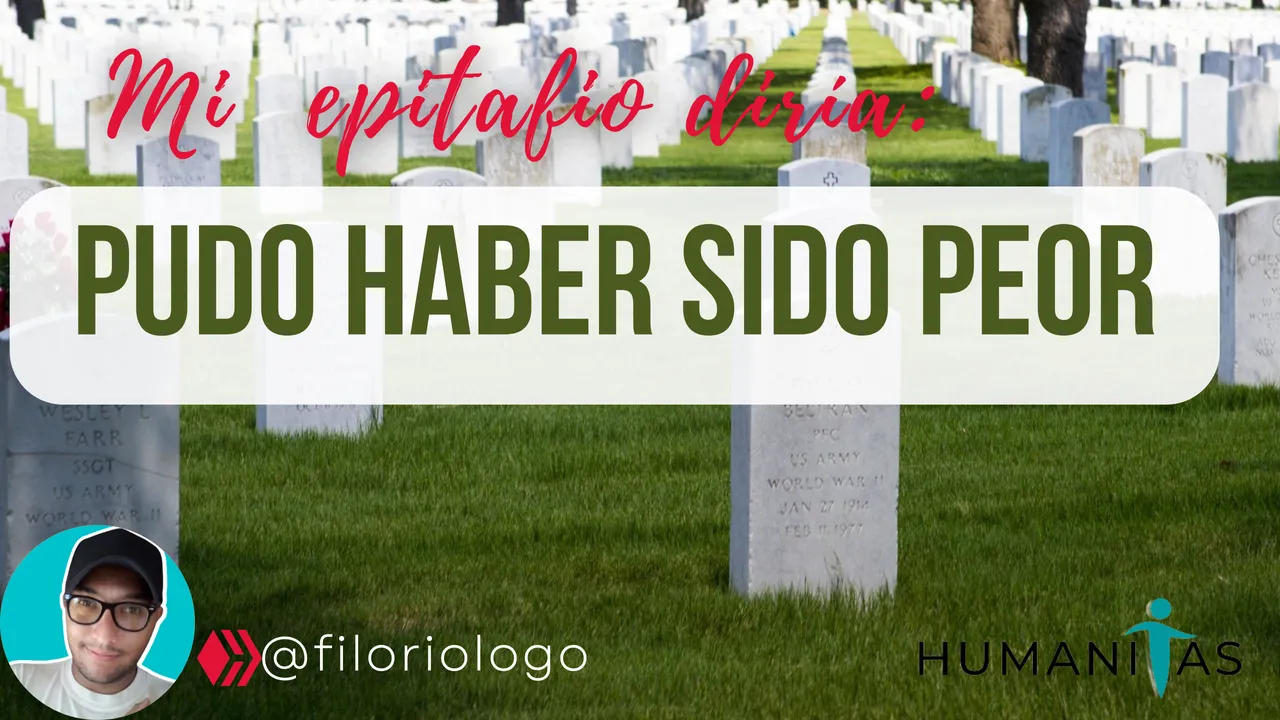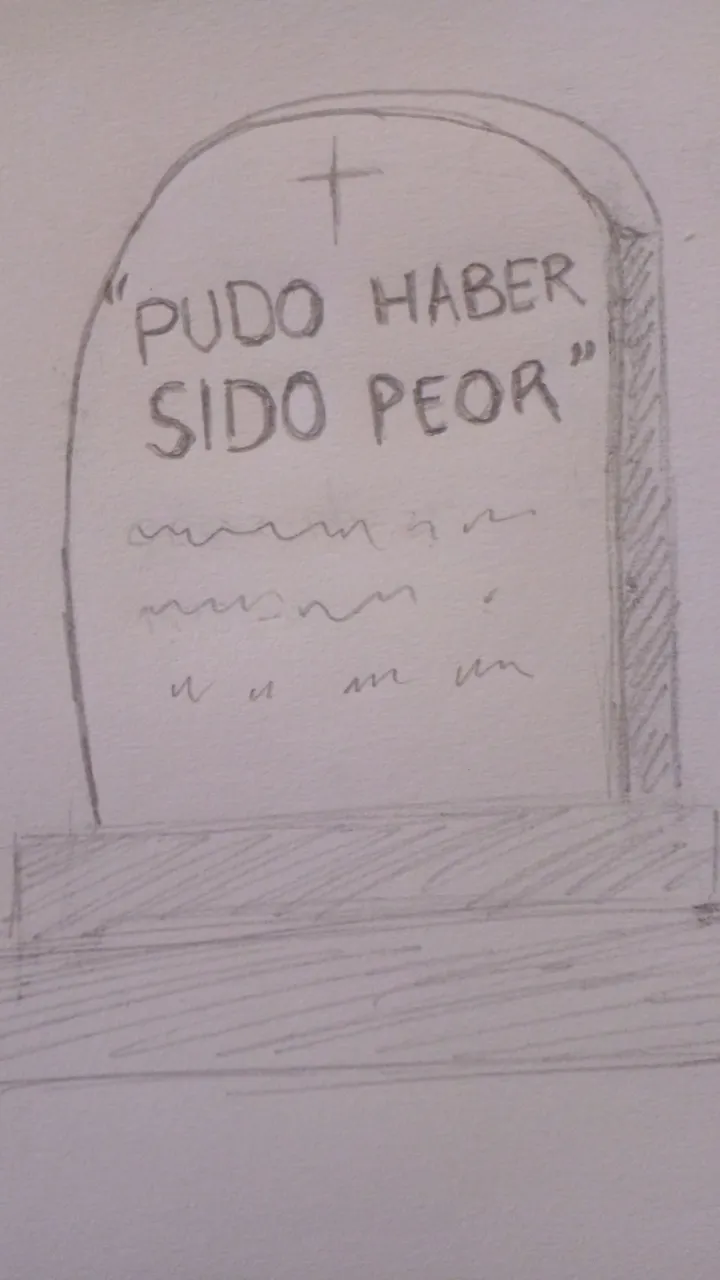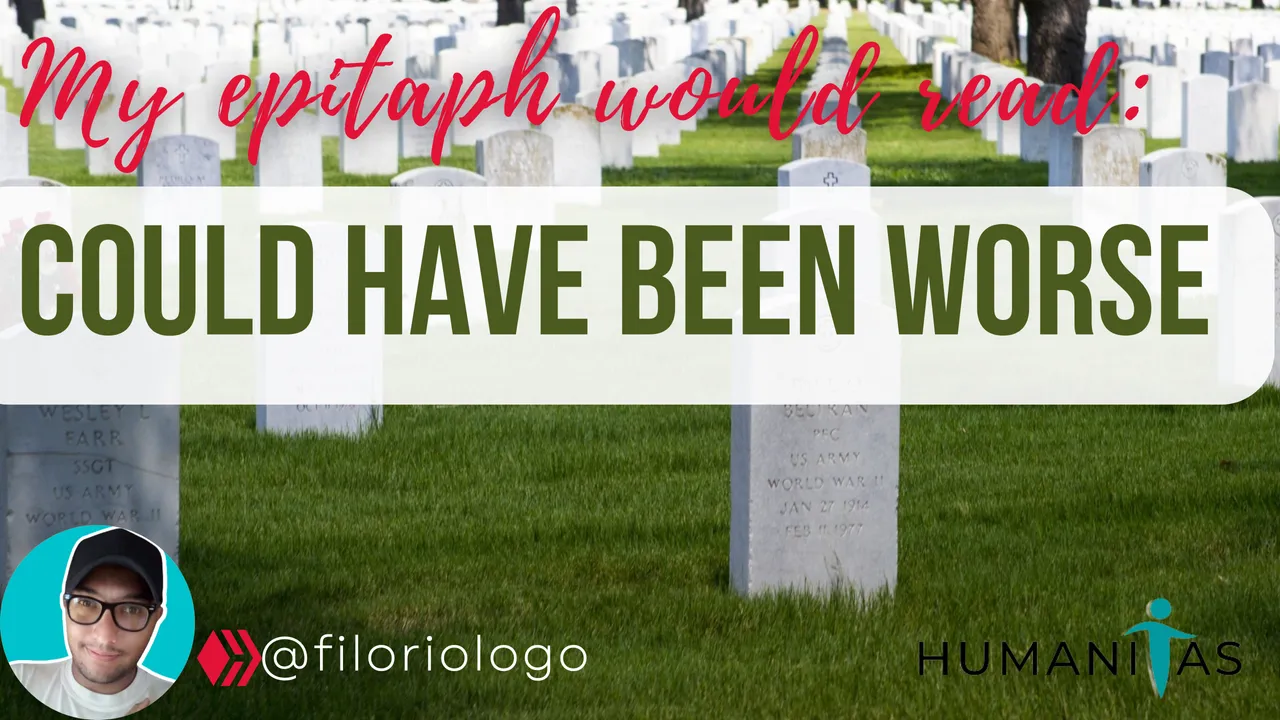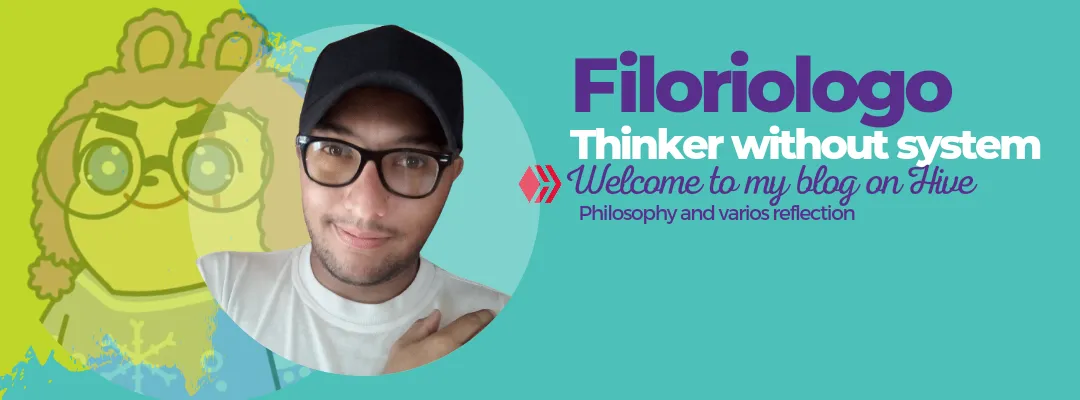
Ante todo quiero comenzar aclarando que esta entrada al Concurso no califica para optar por alguno de los premios que la comunidad ha destinado para las tres entradas que el jurado califique como merecedoras de los incentivos. Así que si tú que me lees, no has participado, ¿Qué esperas? no lo dejes para el final.
Sin más preámbulo, comencemos con esta disertación sobre la muerte. No es la primera vez que he pensado sobre mi epitafio, hace años en alguna terapia psicológica mi terapista me preguntó por aquello que me gustaria estuviese escrito en la lápida de mi tumba creo que tenía como 19 o 20 años cuando cuando eso, y esa fue la primera vez que pensé en tal cosa. Honestamente no recuerdo cual fue mi respuesta, lo cierto es que aquella cuestión quedó marcada en mi espíritu.
Años posteriores en el estudio de la filosofía iba apreciando de algún modo las diversas concepciones sobre la muerte según las corrientes de pensamiento, o depende del filósofo, lo verdaderamente curioso es que todos los que han hecho filosofía, se han preguntado por lo menos una vez sobre este asunto. Si me preguntan a mí por cuál de tantas corrientes filosóficas me inclino en el asunto de la reflexión sobre la muerte, no podría afirmar que mi línea de pensamiento responde a sólo una corriente. Aunque mi mayor influencia ha sido la existencialista cristiana. Aunque, pensándolo bien, la visión de Heidegger que no es para nada una visión creyente, me da un punto de vista interesante.
Heidegger básicamente dirá que la muerte es la posibilidad que imposibilita las demás posibilidades. En la vida se van presentando diversas oportunidades, posibilidades a cada instante. Pude haber decidido no haber escrito, o bien decidir escribirlo como lo hice, porque de ese modo no podrías estar leyéndolo en este preciso instante. De modo que la muerte es una posibilidad, ahora bien, esta posibilidad tiene un factor ontológico interesante.
Cuando nos autoincrepamos y nos preguntamos por el sentido de la vida, entendemos que la vida tiene un por qué, lo más increíble es que el existencialismo nos propone pensar las cosas sin ningún tipo de propósito ulterior, de igual modo la vida o la muerte, son fenómenos en sí mismos carentes de un propósito. Han sido los seres humanos le han conferido un sentido a la vida, para tratar de solapar el profundo sentimiento de angustia, que nos produce una especie de suerte de vértigo el sabernos mortales.
Honestamente pienso que la muerte es lo que da sentido a la vida, y claramente nos diferencia de los dioses, ya que estos al ser inmortales no necesitan de una moral en cambio nosotros los seres humanos tenemos que repensarnos la vida en función de nuestra finitud. La muerte es esa parte de la vida con la que tenemos que reconciliarnos, y uno de los ejemplos más interesantes de la historia de la filosofía es contemplar la muerte de Sócrates.
Este, después de ser condenado a muerte, al parecer se mantuvo inmutable de ánimo y rechazaba las propuestas de escape que le ofrecían sus amigos y familiares. Decía así mismo y a los demás que la muerte era algo interesante de pensar, pero su naturaleza le hace inaccesible en sí, solo podemos especular sobre ella y básicamente Sócrates decía que la muerte podían ser dos cosas:
Morir puede ser como quedarse dormido para siempre.
Morir es ir al Hades (lugar a donde van las almas post mortem) y encontrarse con las grandes personalidades que han pasado por la historia.
De una un otra forma, morir no es nada malo pensándolo desde Sócrates, es solamente toparse con un proceso de la vida que tarde o temprano nos va a llegar.
Ahora bien, habiéndoles hablado un poco sobre algunas ideas sobre la muerte, es momento de contarles:
¿Qué diría mi epitafio?

"PUDO HABER SIDO PEOR"
Sin pensarlo dos veces, este sería mi epitafio porque es mi frase de vida, frase que he hecho mía tras lecturas y práctica constante del estoicismo. Me explico, una de los ejercicios estoicos es la "Praemeditatio Malorum" o en otras palabras la "visualización negativa". Que no es más que imaginar lo peor que puede suceder.
No se trata de andar deseando que las cosas salgan mal o de la peor manera posible, sino que, debemos desear que las cosas ocurran tal cual suceden, y no es para nadie un secreto que no siempre sucede lo mejor, y eso nos molesta, bueno, lo que en realidad nos molesta es nuestro deseo de que lo ocurrido, pudo haber sido diferente. Y en este punto en mi vida entra mi frase "pudo haber sido peor". Siempre que hago algo independientemente de lo que obtenga, me digo a mí mismo "pudo haber sido peor".
Ya que es un ejercicio de abandonar las espectativas que por lo general es lo que nos altera emocionalmente. De modo que me gustaría que en mi lápida, estuviera escrita la frase que siempre he sentido mía y que es mi enseñanza estoica al mundo, cada vez que la digo o la escribo. Sería interesante que en mi no tiempo, es decir, post mortem siga dándole al mundo la misma enseñanza Estoica.
Y además, si lo pensamos bien… resulta realmente gracioso que en una lápida diga "pudo haber sido peor" porque si el epitafio viene a ser lo que el difunto propone como legado, que un muerto te diga "pudo haber sido peor", es realmente jocoso, o por lo menos eso me lo parece.
Gracias por tu tiempo y espero tu comentario si deseas expresar algo en relación a mi post.
Invito a participar a @zullyscott, @jkalthor, @bertrayo , @rlathulerie , @maryed , @eliigonzalez , @wbrandt to participate.

ENGLISH VERSION
What would my epitaph say?

First of all I want to start by clarifying that this entry to the Contest does not qualify to opt for any of the prizes that the community has assigned for the three entries that the jury qualifies as deserving of the incentives. So if you, who read me, have not participated, what are you waiting for, don't leave it to the end.
Without further ado, let's start with this dissertation on death. It is not the first time I have thought about my epitaph, years ago in some psychological therapy my therapist asked me about what I would like to be written on my tombstone, I think I was about 19 or 20 years old when that happened, and that was the first time I thought about such a thing. I honestly do not remember what my answer was, the truth is that that question was marked in my spirit.
Later years in the study of philosophy I was appreciating somehow the different conceptions about death according to the currents of thought, or depending on the philosopher, the really curious thing is that all those who have done philosophy, have wondered at least once about this issue. If you ask me which of so many philosophical currents I lean towards in the matter of reflection on death, I could not affirm that my line of thought responds to only one current. Although my greatest influence has been the Christian existentialist one. Although, thinking about it, Heidegger's vision, which is not at all a believing vision, gives me an interesting point of view.
Heidegger will basically say that death is the possibility that makes all other possibilities impossible. In life, different opportunities, possibilities present themselves at every moment. I could have decided not to have written, or I could have decided to write it as I did, because then you could not be reading it at this very moment. So death is a possibility, but this possibility has an interesting ontological factor.
When we self-increase and ask ourselves about the meaning of life, we understand that life has a why, the most incredible thing is that existentialism proposes us to think about things without any kind of ulterior purpose, in the same way life or death are phenomena in themselves lacking a purpose. It has been human beings who have conferred a meaning to life, in order to try to overcome the deep feeling of anguish, which produces in us a kind of vertigo, knowing that we are mortal.
I honestly think that death is what gives meaning to life, and clearly differentiates us from the gods, since the gods, being immortal, do not need a moral, but we human beings have to rethink life in terms of our finiteness. Death is that part of life with which we have to reconcile ourselves, and one of the most interesting examples in the history of philosophy is to contemplate the death of Socrates.
Socrates, after being condemned to death, apparently remained unchanged in spirit and rejected the proposals of escape offered to him by his friends and family. He told himself and others that death was something interesting to think about, but its nature makes it inaccessible in itself, we can only speculate about it and basically Socrates said that death could be two things:
Dying can be like falling asleep forever.
To die is to go to Hades (the place where post mortem souls go) and meet the great personalities that have gone through history.
In one way or another, to die is not a bad thing if we think about it from Socrates, it is only to encounter a process of life that sooner or later will come to us.
Now, having told you a little about some ideas about death, it is time to tell you:
What would my epitaph say?

"IT COULD HAVE BEEN WORSE".
Without thinking twice, this would be my epitaph because it is my life phrase, a phrase that I have made my own after reading and constant practice of Stoicism. Let me explain, one of the stoic exercises is the "Praemeditatio Malorum" or in other words the "negative visualization". Which is nothing more than imagining the worst that can happen.
It is not about wishing that things go wrong or in the worst possible way, but we must wish that things happen as they happen, and it is no secret that the best does not always happen, and that bothers us, well, what really bothers us is our desire that what happened could have been different. And at this point in my life my phrase "it could have been worse" comes in. Whenever I do something regardless of what I get out of it, I tell myself "it could have been worse".
Because it's an exercise in letting go of expectations which is usually what upsets us emotionally. So I would like to have written on my tombstone the phrase that I have always felt as mine and that is my stoic teaching to the world, every time I say or write it. It would be interesting that in my no time, that is to say, post mortem, I continue giving the world the same Stoic teaching.
And also, if we think about it... it is really funny that on a tombstone it says "it could have been worse" because if the epitaph comes to be what the deceased proposes as a legacy, for a dead person to tell you "it could have been worse", is really funny, or at least that's what it seems to me.
Thanks for your time and I look forward to your comment if you wish to express something in relation to my post.
I invite @zullyscott, @jkalthor, @bertrayo , @rlathulerie , @maryed , @eliigonzalez , @wbrandt to participate.
Cover and Banner: Canva

Otras|Other RRSS

